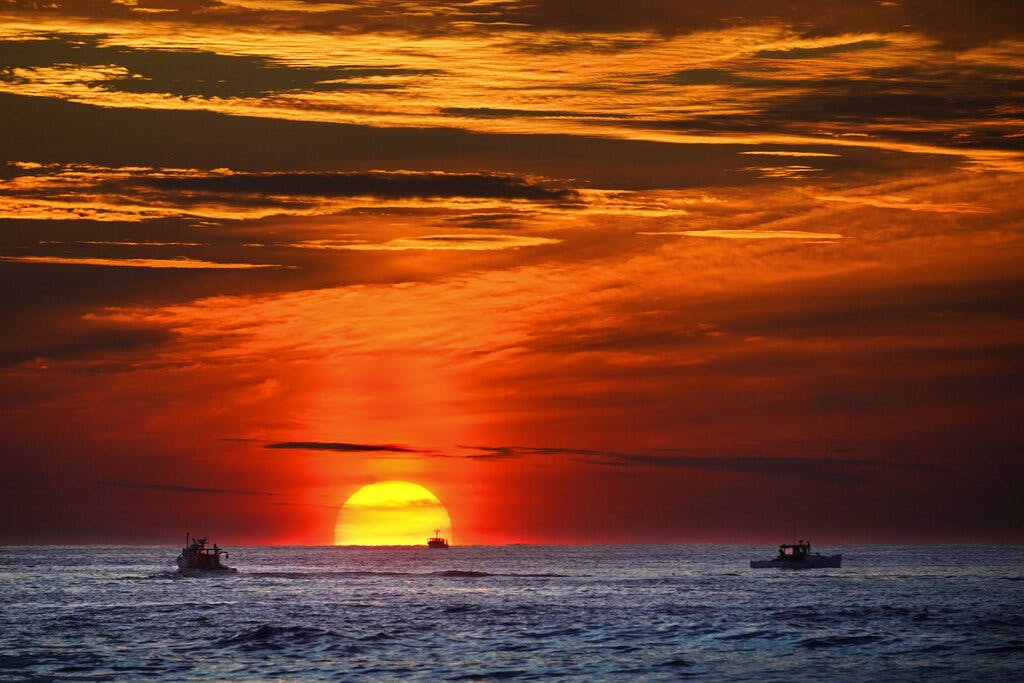Maine Leaders Seeing Red After Lobster Put on List of Seafood To Avoid
The inclusion of American lobster on Seafood Watch’s ‘Red List’ was called ‘a reckless piece of activism that will inflict substantial negative real-world consequences on an important and iconic industry.’

Political leaders in Maine are pushing back against a California environmental group’s placement of their state’s iconic lobster on a “red list” of seafood to be avoided by consumers because the techniques used to harvest them are a threat to a highly endangered whale species.
For decades, the Monterey Bay Aquarium has been tagging specific seafood as problematic in a regularly updated “Seafood Watch” list that carries considerable weight among socially conscious and environmentally minded chefs and consumers. Among the species included on the so-called red list are Atlantic cod, snow crab, and black sea bass from the Gulf of Mexico.
On September 6, the organization added American lobsters caught in both Canada and the Atlantic waters off the northeast coast of the United States to that red list of species to be avoided. The group said that lines holding the traps in which lobster are caught are a danger to North American right whales, of which only about 330 are said to remain in the wild.
“Entanglement in fishing gear is the leading cause of serious injury and death to North Atlantic right whales,” the aquarium said. “As a result, bycatch management is rated ineffective for all pot and set gillnet fisheries operating within the North Atlantic right whale’s range because current management measures do not go far enough to mitigate entanglement risks and promote recovery of the species.”
Many restaurants and other food service companies across the country use the aquarium’s list to determine which species of seafood to avoid and which to include on their menus. A spokeswoman for HelloFresh, one of the largest meal-kit companies in America, told the Associated Press that the company would stop selling lobster following the aquarium’s announcement. Blue Apron, another meal-kit company, did so as well.
“HelloFresh is committed to responsible sourcing and follows guidelines from the Monterey Bay Aquarium Seafood Watch program,” a spokeswoman for HelloFresh, Saskia Leisewitz, said.
The American lobster industry is virtually synonymous with the state of Maine. As much as 82 percent of the country’s lobsters come from coastal Maine, and 4,000 people rely on the industry for their livelihoods. The industry was worth $900 million to the state in 2021.
Politicians from Maine — including the state’s governor, a U.S. senator, and two members of Congress — have demanded that the aquarium immediately reverse its decision to put lobster on its red list. In a letter to the board of directors of the aquarium, they highlighted what they said are significant factual omissions in its report about the industry.
Calling the designation “a reckless piece of activism that will inflict substantial negative real-world consequences on an important and iconic industry in Maine,” the group said the aquarium’s decision “will impact the livelihoods of thousands of people in Maine.”
The letter noted that there has not been a recorded right whale entanglement with Maine lobster gear since 2004, and there has never been a whale death or serious injury connected to Maine’s lobster fishing equipment. Most right whale deaths since 2017, the letter said, have involved collisions with vessels in Canada or entanglement in Canadian gear.
They also noted that Maine fishermen have taken a number of steps in recent years to reduce the likelihood of a right whale ever being endangered by the state’s lobster industry, including eliminating the floating ropes that can be a problem for the whales and removing more than 30,000 miles of line from the waters off Maine.
“You have appointed yourself Judge, Jury, and Executioner of the Maine lobster industry — ignoring clear facts, and not meeting even the most basic burden of proof before coming to a conclusion,” the letter said.
A trade group representing the seafood industry, the National Fisheries Institute, was equally adamant that the aquarium was in the wrong, calling lobster fishing “one of the best managed fisheries in the world” and saying that there is no evidence the industry has affected the endangered whales.
“‘Red Listing’ American lobster actually raises more questions about Monterey Bay Aquarium’s process than it does about the fishery,” the group said in a statement. “U.S. wild-caught American lobster is a smart seafood choice because it is sustainably managed and responsibly harvested under U.S. regulations.”

